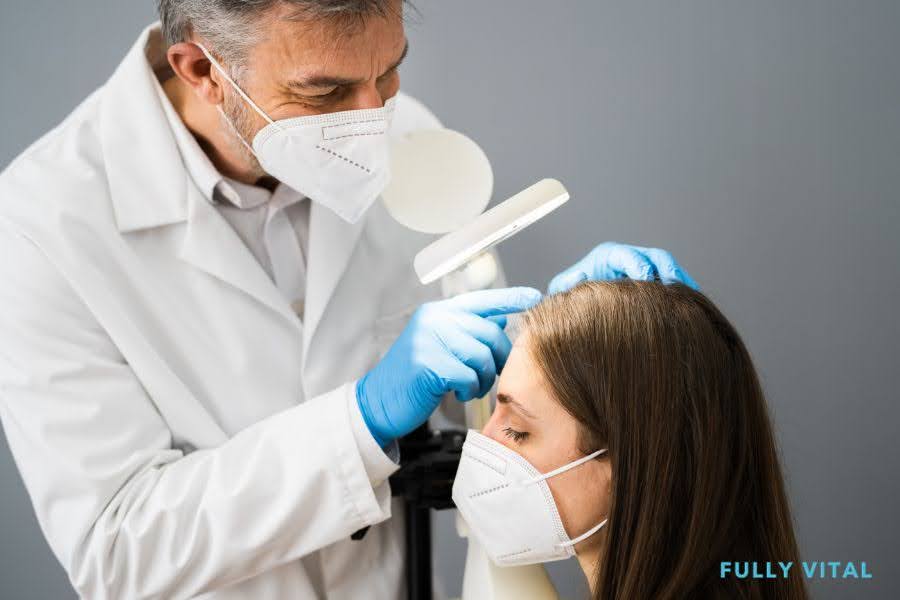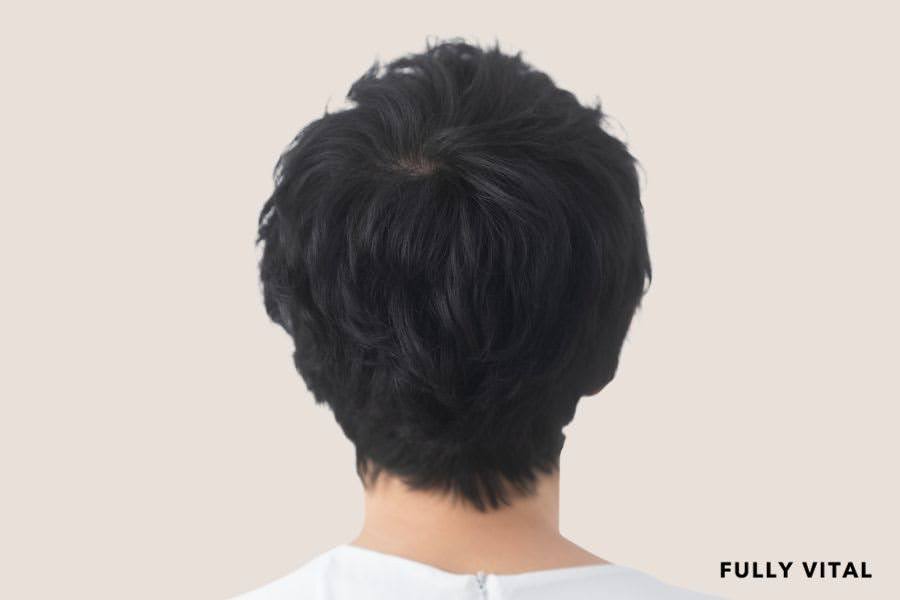
Achieve Gorgeous Locks: Your Path With A Reputable Hair Doctor
Seeking luscious, vibrant hair?
It's not just about looks—it's tied to self-esteem and identity.
A qualified hair doctor is key to your journey towards well-being and confidence.
This article explores professional hair care, conditions a hair doctor can address, and how to find and work with one.
It's not a luxury; it's for anyone serious about hair concerns.
Learn when and why to seek help, what to expect, and how to maintain hair health.
We cover signs to see a specialist, choosing the right one, conditions they treat, the consultation process, and personalized strategies for vibrant hair.
Achieve the luscious hair you've longed for with FullyVital's expert insights and targeted hair care solutions.

I LOVE MY HAIR NOW
FullyVital hair serum and hair vitamins made tremendous improvements in my hair. I truly love my hair now.
Shop Hair ProductsUnderstanding Hair Health And When To Seek A Professional
Understanding hair health and knowing when to seek a professional's help is essential for maintaining strong, vibrant hair.
Here are some key aspects to consider:
Recognizing The Early Signs Of Trouble
Many people only consider professional help when they're facing a full-blown hair crisis.
However, detecting early signs can prevent severe damage and reduce the need for more intensive treatments.
Look out for excessive hair shedding, noticeable thinning, or changes in texture.
Scalp discomfort, such as persistent itching or flaking, should also raise a red flag.
Symptoms That Indicate A Visit To A Hair Doctor
Beyond the normal hair challenges, certain symptoms shouldn't be ignored.
If you encounter sudden bald patches, redness, scaling, or if your hair problems are causing you distress, it's time to seek out a hair doctor.
These symptoms can indicate underlying health conditions which may require specialized care.
The Role Of A Hair Doctor In Your Hair Care Routine
A regular hair care routine might not be enough if you're struggling with specific issues.
Hair doctors, or trichologists, specialize in the science of the hair and scalp and can pinpoint the root cause of your problems.
They play a vital role in identifying disorders, suggesting treatments, and providing guidance on product use and lifestyle adjustments to enhance your hair health.
The Expertise Of A Hair Doctor
A hair doctor, often known as a dermatologist or a trichologist, is a medical professional who specializes in diagnosing and treating conditions related to the hair and scalp.
These experts have specialized knowledge and training in hair disorders, making them valuable for individuals experiencing various hair and scalp issues.
Qualifications And Training
A hair doctor, or trichologist, possesses specialized knowledge acquired through rigorous training.
This typically involves studying trichology's principles, which encompass the structure, function, and diseases of the human hair and scalp.
An adept hair doctor stays updated with the latest research and treatment methods to provide high-quality care.
The Science Behind Hair And Scalp Health
Understanding the science is crucial when dealing with hair issues.
Hair doctors delve into various scientific aspects, including genetics, nutrition, and the effects of environmental factors on hair health.
Their expertise enables them to approach hair care from a holistic viewpoint, taking into account all possible contributors to hair and scalp conditions.
How A Hair Doctor Differs From A Dermatologist
While dermatologists deal with a broad range of skin issues, including the scalp, trichologists focus strictly on the hair and scalp.
This concentrated expertise means that a hair doctor is often better equipped to handle intricate issues related to hair growth, hair loss, and scalp problems, providing more targeted advice and treatments.
Common Hair And Scalp Conditions Treated By Hair Doctors
Hair doctors, also known as dermatologists or trichologists, are trained to diagnose and treat a wide range of hair and scalp conditions.
Hair Loss: Understanding The Causes
Hair loss can result from a multitude of factors including genetics, hormonal changes, medical conditions, and medications.
A hair doctor can help differentiate between temporary and permanent hair loss, guiding you through the complexities and recommending appropriate action.
Breaking Down Treatment Options For Hair Loss
Once the cause of hair loss is established, a hair doctor can navigate the many treatment options available, from medication to non-surgical methods.
The goal is to find the most effective treatment that aligns with your individual needs and lifestyle.
Scalp Conditions: From Dandruff To Psoriasis
Scalp conditions are not merely cosmetic issues.
Dandruff, psoriasis, and other scalp ailments can signal health problems and require proper diagnosis and treatment.
Hair doctors can offer specialized treatments that go beyond the scope of over-the-counter solutions.
Innovations In Treating Hair And Scalp Disorders
The field of hair and scalp treatment is always advancing, with new technologies and therapies emerging.
Hair doctors remain at the forefront of these developments, providing patients with access to innovative treatments that may not be widely known or available yet.
Dealing With Thinning Hair: A Holistic View
Thinning hair can be a distressing condition, and a hair doctor can provide a holistic approach to treatment.
This might involve looking at nutritional deficits, stress levels, and hormonal balance, offering a comprehensive plan to promote hair density and health.
The Hair Doctor Consultation Process
The consultation process with a hair doctor, whether it's a dermatologist or a trichologist, is crucial for diagnosing and addressing your hair and scalp concerns.
Here's an overview of what you can expect during a typical hair doctor consultation:
Preparing For Your First Visit
Setting up an appointment with a hair doctor is the first step towards addressing your concerns.
Before you visit, gather information on your medical history, current medications, and any hair care products you use.
This prep work ensures that the consultation is as informative and efficient as possible.
What To Expect During Your First Visit
Your initial appointment will generally include a thorough examination of your hair and scalp, a review of your health history, and a discussion about your specific hair issues.
Be prepared to answer questions about your diet, lifestyle, and any stressors that may affect your hair health.
Tests And Diagnosis Procedures
Depending on your situation, the hair doctor might suggest certain tests, such as blood work or scalp biopsies, to diagnose your condition accurately.
These tests help rule out potential causes of hair loss or scalp issues and are crucial for creating an effective treatment plan.
Aftercare And Monitoring Your Progress
The journey to healthier hair doesn't end after your appointment.
Your hair doctor will provide aftercare instructions and may schedule follow-up visits to monitor your progress.
Keeping in touch and updating your specialist on any changes is key to the success of your treatment plan.

Personalized Hair Care Strategies
Personalized hair care strategies are tailored routines and practices that take into account your unique hair type, texture, and specific needs.
Creating a personalized hair care plan can help you achieve and maintain healthy, vibrant hair.
Conventional Vs. Cutting-Edge Treatment Options
Hair doctors are equipped with a range of conventional treatments that have stood the test of time, as well as cutting-edge options that leverage the latest advancements in the field.
From topical treatments to laser therapy, they can suggest the best course of action based on efficacy and individual suitability.
The Importance Of A Tailored Approach
Each person's hair and scalp are unique, which means there's no one-size-fits-all solution when it comes to treatment.
Hair doctors assess individual factors, such as hair type, lifestyle, and health conditions, to craft a personalized strategy that addresses your specific concerns.
Home Care Tips And Tricks
Alongside professional treatments, a hair doctor might also offer guidance on home care.
They can recommend changes to your hair care regime, including gentle handling of wet hair, avoiding harsh chemicals, and selecting the right products to support the health of your scalp and hair.
Integrating Treatments With Your Lifestyle
Understanding your daily routine and commitments allows hair doctors to suggest treatments that seamlessly integrate with your lifestyle.
Whether this involves at-home care steps or in-clinic procedures, the goal is to create a plan that you can adhere to consistently for the best results.
The Role Of Nutrition In Hair Health
Nutrition plays a significant role in hair health, and deficiencies can lead to varying hair disorders.
Hair doctors might provide dietary recommendations or supplement suggestions to ensure your body receives the necessary nutrients for healthy hair growth and maintenance.
Maintenance And Follow-Up
Maintenance and follow-up are crucial aspects of any hair care or treatment plan.
Once you've established a personalized hair care routine or undergone treatments, it's essential to maintain your hair's health and monitor your progress.
Here are some key steps to consider for maintenance and follow-up:
Tracking Progress And Adjusting Treatments
It's essential to monitor the effectiveness of the treatment plan over time.
A hair doctor might suggest regular check-ins to assess the progress and make necessary adjustments.
These adjustments are based on how your hair responds to the treatment, ensuring that the approach remains effective and aligned with your hair health goals.
Long-Term Strategies For Sustained Hair Vitality
Sustaining the health of your hair often requires a long-term strategy.
Hair doctors can provide insights into how to maintain the vitality of your hair through ongoing care, which may include periodic treatments, consistent home care practices, and preventive measures.
When To Reevaluate Your Treatment Plan
There might come a time when your treatment plan needs reevaluation, whether due to changes in your condition or new developments in hair care treatments.
A hair doctor remains your ally, helping you navigate changes and updating your plan to suit your evolving needs.
Building A Relationship With Your Hair Doctor
A successful partnership with your hair doctor involves open communication and trust.
Building this relationship is pivotal, as it allows for a deeper understanding of your hair health history and ensures personalized care over the years.
Emphasizing The Role Of Consistency In Treatment Success
Consistency in following your treatment plan is critical to its success.
A hair doctor ensures that the plan is manageable for you, maximizing the likelihood of adherence and positive outcomes.
Choosing The Right Hair Doctor For You
Choosing the right hair doctor, whether it's a dermatologist or a trichologist, is essential for addressing your hair and scalp concerns effectively.
Here are some steps to help you select the right hair doctor for your needs:
What To Look For In A Hair Doctor
Identifying a capable hair doctor involves checking their qualifications, experience, and approach to treatment.
Look for someone who is not only knowledgeable but also takes the time to listen and understand your concerns.
Researching And Evaluating Potential Hair Doctors
Do your homework by researching potential hair doctors in your area.
Check their reviews, ask for before-and-after photos of previous clients, and consider their specialties to ensure they align with your needs.
Questions To Ask During Your Consultation
When you meet with a potential hair doctor, ask pointed questions.
Inquire about their experience with your particular condition, the treatments they suggest, and their reasoning behind the choices.
Discover the Power of Fully Vital Hair Growth ProductsAt Fully Vital, we understand the frustration and concern that comes with the aging of your hair. That's why we have developed a range of hair growth products that are designed to stop and reverse the aging process, giving you healthier, more resilient locks. Here are some key features and benefits of our products:
With Fully Vital, you can take control of your aging hair and achieve the beautiful, vibrant locks you deserve. Experience the power of our hair growth products and unlock your hair's true potential. |
Final Thoughts On Hair Doctor
The journey to achieving and maintaining gorgeous locks is multifaceted and often requires professional assistance.
Consulting with a hair doctor can provide invaluable insights into your hair's specific needs, addressing underlying health issues, and crafting a customized care strategy.
Whether you're dealing with hair loss, scalp conditions, or looking for ways to improve hair health, a hair doctor can guide you through evidence-based treatments and preventative measures.
Remember that each step forward is progress, and with the right support and information, you can nurture your hair from the inside out and enjoy the confidence that comes with healthy, vibrant hair.
Check out these blogs:
- Micro Bangs: Everything You Need To Know For Stylish Hair
- Citric Acid For Hair
- Can You Regrow Hair Naturally In 3 Weeks? Exploring The Options
Frequently Asked Questions About Hair Doctor
When Should I Consider Seeing A Hair Doctor?
You should see a hair doctor if you're experiencing excessive hair loss, thinning, scalp discomfort, or any persistent issues that affect your hair or scalp health.1
What Qualifications Should A Hair Doctor Have?
A reputable hair doctor should have specialized training in trichology, be knowledgeable in the latest research and treatments, and ideally have professional membership or certification from a recognized trichology.2
What's The Difference Between A Hair Doctor And A Dermatologist?
A hair doctor specializes in hair and scalp health, while a dermatologist treats a broad range of skin issues, which can include the scalp.3
Hair doctors focus specifically on the hair and scalp, often providing more targeted treatments for hair conditions.
What Common Conditions Do Hair Doctors Treat?
Hair doctors can treat a variety of conditions, including different forms of hair loss, scalp disorders like dandruff and psoriasis, and other hair-related issues like thinning and breakage.4
What Can I Expect During A Consultation With A Hair Doctor?
During a consultation, expect a detailed examination of your hair and scalp, a review of your medical history, and a discussion of your hair concerns.5
Tests may be recommended to aid diagnosis.
How Are Hair Treatments Personalized?
Hair treatments are personalized based on individual factors like hair type, condition severity, lifestyle, and underlying health issues.6
A tailored approach ensures the most effective and sustainable treatment.
Can Hair Doctors Recommend Home Care Routines?
Yes, hair doctors can offer advice on home care routines, including product recommendations and tips for handling hair to prevent damage and support scalp health.7
Are There Any Myths About Hair Care That I Should Be Aware Of?
Yes, many myths about hair care exist, such as the effectiveness of certain 'miracle' products or treatments.8
A hair doctor can help debunk these myths and guide you towards evidence-based care.
How Can I Choose The Right Hair Doctor?
To choose the right hair doctor, research potential specialists' qualifications, experience, and approach to treatment.9
During a consultation, ask about their experience with your particular concerns and the treatment options they suggest.
How Long Does It Take To See Results From Hair Treatments?
The time it takes to see results varies depending on the condition and treatment type.10
Some treatments may show improvements within a few weeks, while others may take several months or more.
Sources:
- Cosmetology Guru. (n.d.). How to Become a Trichologist - A Comprehensive Guide. Retrieved from https://cosmetologyguru.com/blog/how-to-become-a-trichologist/
- Rudnicka, L., Olszewska, M., Rakowska, A., & Kowalska-Oledzka, E. (2018). Trichoscopy: A systematic approach. Springer. https://doi.org/10.1007/978-3-319-72134-0
- Verywell Health. (2023). Scalp Conditions: Causes, Treatment, and Pictures. Retrieved from https://www.verywellhealth.com/scalp-conditions-5186741
- Medical News Today. (2023). 11 Best Hair Growth Products for Healthy Hair and Scalp in 2023. Retrieved from https://www.medicalnewstoday.com/articles/hair-growth-products
- American Psychological Association. (2023). Psychosocial impact of androgenetic alopecia on men: A systematic review. Retrieved from https://psycnet.apa.org/record/2024-03149-001
- InStyle. (2023). 7 Best Hair Loss Treatments of 2023. Retrieved from https://www.instyle.com/hair-loss-treatments-7370121
- Harvard Gazette. (2021). Research identifies how chronic stress may lead to hair loss. Retrieved from https://news.harvard.edu/gazette/story/2021/03/researchers-discover-how-chronic-stress-leads-to-hair-loss/
- HairGuard. (n.d.). Scalp Biopsies: Everything You Need to Know To Diagnose Hair Loss. Retrieved from https://www.hairguard.com/scalp-biopsies/
- Healthline. (2023). Stress and Hair Loss: Are They Related? Retrieved from https://www.healthline.com/health/stress/stress-hair-loss
- National Institutes of Health (NIH). (n.d.). How stress causes hair loss. Retrieved from https://www.nih.gov/news-events/nih-research-matters/how-stress-causes-hair-loss








